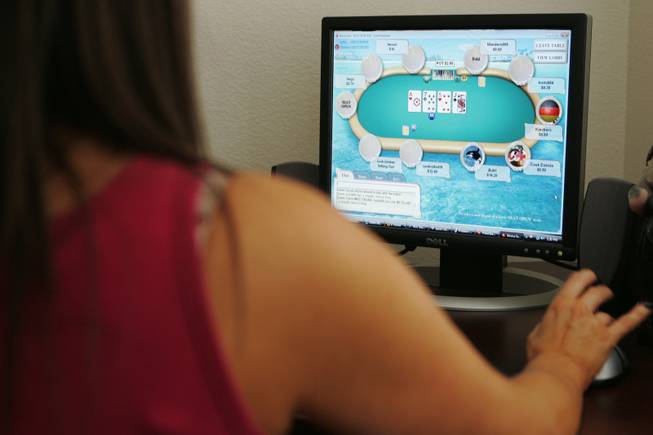Reid faces challenges in keeping online poker coalition intact
Friday, Aug. 3, 2012 | 2 a.m.
WASHINGTON —

Harry Reid
Related stories
The Justice Department’s reinterpretation of the Wire Act might have given Sen. Harry Reid the dose of urgency he needed to sign up congressional support for online poker legislation. But it’s also made the task of keeping a coalition of supporters together much more complicated.
Once upon a time, legalizing online poker was a slow and simple matter of convincing a few skeptics that it was a good idea to bring an industry with millions of devotees out of the shadows.
But now that the Justice Department has opened the Internet floodgates to all forms of casino games, states across the country are looking to launch online gambling platforms as a way to help bolster their tax base.
That means Reid has to be careful not to alienate the slew of senators from those states — many of them natural allies of Reid’s online poker effort — with a bill that sticks too closely to a poker-only model. And other recent supporters of online gaming, including American Indian tribes, must be persuaded to trust Reid and his chief negotiating partner, Sen. Jon Kyl, to come up with an agreeable system.
Those competing interests make it challenging to keep a united public front while talks and vote counts continue behind closed doors.
Last week, Daniel Akaka, the retiring senator from Hawaii, produced the first online gaming bill the country has seen since the Justice Department said everything short of sports betting is legal.
The bill focused on tribes, relative newcomers to the online poker fold. Last year, many tribe leaders were urging Congress not to legalize online poker; now, seeing a business opportunity, they are appealing to key lawmakers with their wish lists for a federal Internet gaming bill.
They praise Akaka’s efforts, but they are critical of Reid and Kyl.
“With Indian gaming representing over 40 percent of the gaming market, it is inconceivable, given the recent DOJ opinion ... that tribes are not being consulted,” said Glen Gobin, secretary of the Tulalip Tribes in Washington state and a recent online poker convert, said of Reid’s and Kyl’s bill-making.
As latecomers to the debate, the tribes are at a disadvantage: Although the Wire Act reinterpretation opened up gambling to them, none has unveiled a proposal to regulate online gambling, much less implemented such games.
The tribes’ best option to get in the online poker game is some sort of special consideration in a federal bill — and what they get might determine which senators ultimately vote for the bill.
“I have an open mind on how we solve the problems with Internet gaming,” said Republican Sen. John Hoeven of North Dakota, a state with five Indian reservations, each of which operates casinos. “But whatever we do has to be fair.”
The online poker industry is too big, however, to be fair to everyone.
“There are hundreds of gaming institutions; they’re not all going to be able to be in the business,” former Rep. Jon Porter, now a lobbyist for gaming companies, told the committee. “A lot of other states are moving and preparing. I’d highly encourage the tribal nations to be prepared and not wait.”
But at the other end of the coalition spectrum, certain states are so far ahead of the congressional process that a bill making only online poker legal could be akin to a request to stuff the online gaming genie back in the bottle.
Most experts agree that because of the Justice Department’s Wire Act interpretation, the Reid-Kyl bill will have two parts: One reinterpreting the Unlawful Internet Gambling Enforcement Act to allow interstate transactions for poker, and another redefining the Wire Act, so it renders every other form of online gaming illegal.
This spring, Illinois became the first state to get its lottery up and running online.
“Part of the thought process ... is that states should go ahead and carve out what they’re doing now because if they do, they would probably be grandfathered into existing law by anything the federal government might do in the future,” said Michael Jones, superintendent of the Illinois lottery.
Since then, states such as New York have put their lotteries partially online, while others — such as Iowa, California, New Jersey and Delaware — also are considering expanding their state online gambling laws to include more than just poker. Accommodating the full roster of expanded laws is more than Congress seems ready to take.
“Obviously what we don’t want is to provide a bunch of exceptions for states that have already passed legislation that are already online with whatever gambling that they want to put online,” Sen. Dean Heller, R-Nev., told reporters last month. “I do believe if we don’t do something by the end of the year, it will be too late.”
Jones seems fairly convinced that the federal government won’t care to touch his state lottery, saying he believed “there would be a constitutional question, even, if they did that.”
But while administrators such as Jones argue lotteries are different than other casino games, experts warn that they are the tip of a slippery slope.
“When you look at the lottery interests, many of them want to use a scratch card, which enters us into slot machines,” Porter said at the Indian Affairs hearing. “So I think the real question you’re going to need to address is lotteries, eventually.”
Drawing the line between which forms of gambling get a waiver under the bill and which forms are left out is up to Reid and Kyl. But when it comes to such specifics, they and their surrogates aren’t talking.

No comments:
Post a Comment